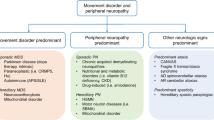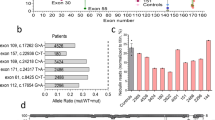Abstract
Pathogenic variants in the HINT1 gene lead to hereditary axonopathy with neuromyotonia. However, many studies show that neuromyotonia may remain undiagnosed, while axonopathy is the major clinical finding. The most common cause of neuromyotonia and axonopathy, especially in patients of Slavic origin, is a c.110G>C (p.Arg37Pro) pathogenic variant in homozygous or compound heterozygous state. In this study, we analyzed a peripheral neuropathy caused by pathogenic variants in the HINT1 gene and evaluated its contribution to the hereditary neuropathy structure. The studied group included 1596 non-related families diagnosed with hereditary motor and sensory neuropathy (HMSN). The results show that HINT1 gene pathogenic variants make a significant contribution to the hereditary neuropathy epidemiology in Russian patients. They account for at least 1.9% of all HMSN cases and 9% of axonopathy cases. The most common HINT1 pathogenic variant in Russian patients is the c.110G>C (p.Arg37Pro) substitution. Its allelic frequency is 0.2% (95% CI 0.19–0.21%), carrier frequency is 1 in 250 people in Russian Federation, and the estimated disease incidence is 1 in 234,000 individuals. It was determined that the cause of this pathogenic variant’s prevalence is the founder effect.

Similar content being viewed by others
References
Zimoń M, Baets J, Almeida-Souza L, De Vriendt E, Nikodinovic J, Parman Y, Battaloğlu E, Matur Z, Guergueltcheva V, Tournev I, Auer-Grumbach M, De Rijk P, Petersen BS, Müller T, Fransen E, Van Damme P, Löscher WN, Barišić N, Mitrovic Z, Previtali SC, Topaloğlu H, Bernert G, Beleza-Meireles A, Todorovic S, Savic-Pavicevic D, Ishpekova B, Lechner S, Peeters K, Ooms T, Hahn AF, Züchner S, Timmerman V, Van Dijck P, Rasic VM, Janecke AR, De Jonghe P, Jordanova A (2012) Loss-of-function pathogenic variants in HINT1 cause axonal neuropathy with neuromyotonia. Nat Genet 44(10):1080–1083. https://doi.org/10.1038/ng.2406
Boaretto F, Cacciavillani M, Mostacciuolo ML, Spalletta A, Piscosquito G, Pareyson D, Vazza G, Briani C (2015) Novel loss-of-function pathogenic variant of the HINT1 gene in a patient with distal motor axonal neuropathy without neuromyotonia. Muscle Nerve 52(4):688–689. https://doi.org/10.1002/mus.24720
Zhao H, Race V, Matthijs G, De Jonghe P, Robberecht W, Lambrechts D, Van Damme P (2014) Exome sequencing reveals HINT1 pathogenic variants as a cause of distal hereditary motor neuropathy. Eur J Hum Genet 22(6):847–850. https://doi.org/10.1038/ejhg.2013.231
Laššuthová P, Brožková DŠ, Krůtová M, Neupauerová J, Haberlová J, Mazanec R, Dvořáčková N, Goldenberg Z, Seeman P (2015) Pathogenic variants in HINT1 are one of the most frequent causes of hereditary neuropathy among Czech patients and neuromyotonia is rather an underdiagnosed symptom. Neurogenetics 16(1):43–54. https://doi.org/10.1007/s10048-014-0427-8
Dadali EL, Nikitin SS, Kurbatov SA, Murtazina AF, Sharkova IV, Shchagina OA, Konovalov FA (2017) Clinical and genetic characteristics of autosomal recessive axonal neuropathy with neuromyotonia in Russian patients. Neuromuscul Dis 7(3):47–55. https://doi.org/10.17650/2222-8721-2017-7-3-47-55. (In Russian)
Bengtsson BO, Thomson G (1981) Measuring the strength of associations between HLA antigens and diseases. Tissue Antigens 18:356–363
Diaz GA, Gelb BD, Risch N, Nygaard TG, Frisch A, Cohen IJ, Miranda CS, Amaral O, Maire I, Poenaru L, Caillaud C, Weizberg M, Mistry P, Desnick RJ (2000) Gaucher disease: the origins of the Ashkenazi Jewish N370S and 84GG acid beta-glucosidase pathogenic variants. Am J Hum Genet 66(6):1821–1832. https://doi.org/10.1086/302946
Veltsista D, Chroni E (2016) A first case report of HINT1-related axonal neuropathy with neuromyotonia in a Greek family. Clin Neurol Neurosurg 148:85–87. https://doi.org/10.1016/j.clineuro.2016.07.012
Horga A, Cottenie E, Tomaselli PJ, Rojas-García R, Salvado M, Villarreal-Pérez L, Gamez J, Márquez-Infante C, Houlden H, Reilly MM (2015) Absence of HINT1 pathogenic variants in a UK and Spanish cohort of patients with inherited neuropathies. J Neurol 262(8):1984–1986. https://doi.org/10.1007/s00415-015-7851-z
Rauchenzauner M, Frühwirth M, Hecht M, Kofler M, Witsch-Baumgartner M, Fauth C (2016) A novel variant in the HINT1 gene in a girl with autosomal recessive axonal neuropathy with neuromyotonia: thorough neurological examination gives the clue. Neuropediatrics 47(2):119–122. https://doi.org/10.1055/s-0035-1570493
Wang Z, Lin J, Qiao K, Cai S, Zhang VW, Zhao C, Lu J (2018) Novel pathogenic variants in HINT1 gene cause the autosomal recessive axonal neuropathy with neuromyotonia. Eur J Med Genet 62(3):190–194. https://doi.org/10.1016/j.ejmg.2018.07.009
Author information
Authors and Affiliations
Corresponding author
Ethics declarations
Conflict of interest
The authors declare that they have no conflict of interest.
Ethical approval
The study was approved by the local ethics committee of the Federal State Budgetary Institution “Research Centre for Medical Genetics” (the approval number 2018-5/4).
Informed consent
Informed consent was obtained from all individual participants included in the study.
Additional information
Publisher's Note
Springer Nature remains neutral with regard to jurisdictional claims in published maps and institutional affiliations.
Electronic supplementary material
Below is the link to the electronic supplementary material.
Rights and permissions
About this article
Cite this article
Shchagina, O.A., Milovidova, T.B., Murtazina, A.F. et al. HINT1 gene pathogenic variants: the most common cause of recessive hereditary motor and sensory neuropathies in Russian patients. Mol Biol Rep 47, 1331–1337 (2020). https://doi.org/10.1007/s11033-019-05238-z
Received:
Accepted:
Published:
Issue Date:
DOI: https://doi.org/10.1007/s11033-019-05238-z




